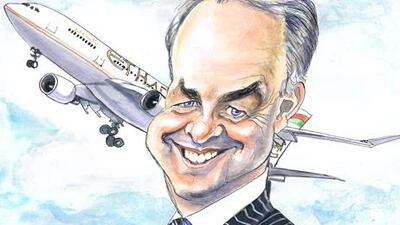James Hogan has travelled a long way since starting his career at the check-in desk of Ansett Airlines more than 35 years ago.
He moved up the corporate ladder at a variety of major service industry companies before joining Etihad Airways in 2006 as chief executive.
But his early experience in dealing with truculent passengers has made him an ideal choice to take Abu Dhabi’s flag carrier to the next level.
Known for a no-nonsense approach and common touch, Mr Hogan is in his element fending off accusations of unfair competition by European and US carriers. And with his rugby-player’s frame, his shoulders are broad enough to cope with some of the criticisms that have been levelled against the airline.
The latest flak that came his way was fired by Pierre-Henri Gourgeon, the Air France-KLM chief executive, who accused Gulf airlines of benefiting unfairly from export guarantees for Airbus and Boeing aircraft.
Mr Hogan’s response is at once considered and forthright. “Why do European and North American airlines have a colonial right to rule the world?” he said in a recent interview.
“We have to be careful that one or two airline CEOs with vested interests don’t blow this issue out of proportion.”
Despite his apparent outrage, Mr Hogan could equally take the West’s comments as a form of flattery. Implicit is a recognition of the speed with which Etihad has grown from a fledgling operator into a global aviation contender in his little more than four years at the helm.
Since he took over, the carrier has added 33 destinations and 35 new aircraft, and increased the number of passengers carried each year from 2.8 million in 2006, to more than 7 million last year.
With this rapid growth, Mr Hogan continued a pattern set by his predecessors: in June 2006, a few months before he was appointed the chief executive of Etihad, the airline launched its 30th destination since it was formed at the end of 2003. And during Mr Hogan’s tenure, Etihad has branched out in new ways. It has focused on award-winning service and cabin offerings, become an integral part of Abu Dhabi’s 2030 plan, and secured a flurry of code-share alliances with other airlines to extend its reach. The latest of these was a major strategic alignment with the Virgin Blue Group signed last August to target the Australian market.
As the airline has grown, Mr Hogan has increasingly emphasised its "brand ambassador" role for the capital including sponsorships of an Australian football stadium, the Abu Dhabi Formula One Grand Prix and the English Premiership football team Manchester City.
Mr Hogan, 54, started at the sharp end of the airline industry.
“I began my career at the check-in desk,” he said.
Several promotions later, he moved into senior positions at bmi, Forte Hotels and then Hertz, where he spent 13 years. Mr Hogan returned to Australia in 2001, where he was appointed the chief executive of the Tesna consortium, created as part of an unsuccessful effort to acquire Ansett Airlines from administration.
His experience in the Middle East began a year later when he was appointed the chief executive of Gulf Air. He soon instituted a turnaround programme dubbed Project Falcon, which would seek Gulf Air’s first profits since 1997.
In 2004, Gulf Air swung back into the black, posting a US$4 million (Dh14.69m) profit and burnishing Mr Hogan’s management credentials. At Gulf Air, he also discovered a flair for marketing, re-branding the airline and launching unique services such as Gulf Traveller, an all-economy service based at Abu Dhabi International Airport, Sky Chefs, which features five-star chefs whipping up meals in-flight for first-class travellers, and Sky Nannies, an in-flight childcare service.
Mr Hogan resigned from Gulf Air in mid-2006, saying at the time that Project Falcon had been completed. Months later, Etihad installed him as its chief executive.
At Etihad, Mr Hogan turned his attention to putting the “glue” in the airline’s network, increasing the number of flights and re-aligning flight times to better co-ordinate the flow of travellers across Etihad’s hub.
He also introduced narrow-body aircraft into the fleet, giving the airline improved flexibility and extended service to routes with lighter demand.
On Mr Hogan’s watch, the carrier rose to sixth place in the Skytrax worldwide airline ranking survey for last year (second in the region only to Qatar Airways, which finished third). In addition, Etihad walked away with Skytrax’s top honours for best business class in 2009, and best first class last year.
With an eye to the next phase of growth, Mr Hogan in 2008 presided over Etihad’s largest aircraft order, and one of the biggest deals in aviation history.
The deal, made during the 2008 Farnborough International Airshow in the UK, included commitments for 100 aircraft from Boeing and Airbus, plus options for another 105 aircraft. If all options are exercised, the order will be worth $43bn at list prices.
But as Etihad reaches a critical mass, analysts say Mr Hogan and the carrier will face a host of challenges in the highly competitive market for international air travel, especially with such ambitious neighbours as Emirates Airline and Qatar Airways.
igale@thenational.ae

